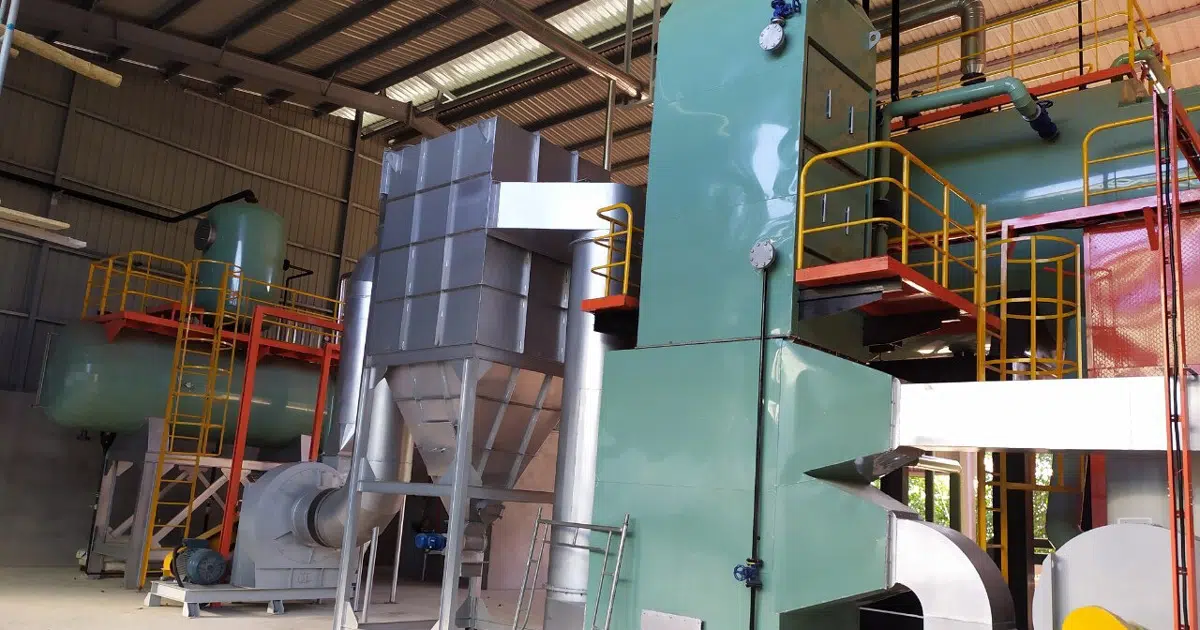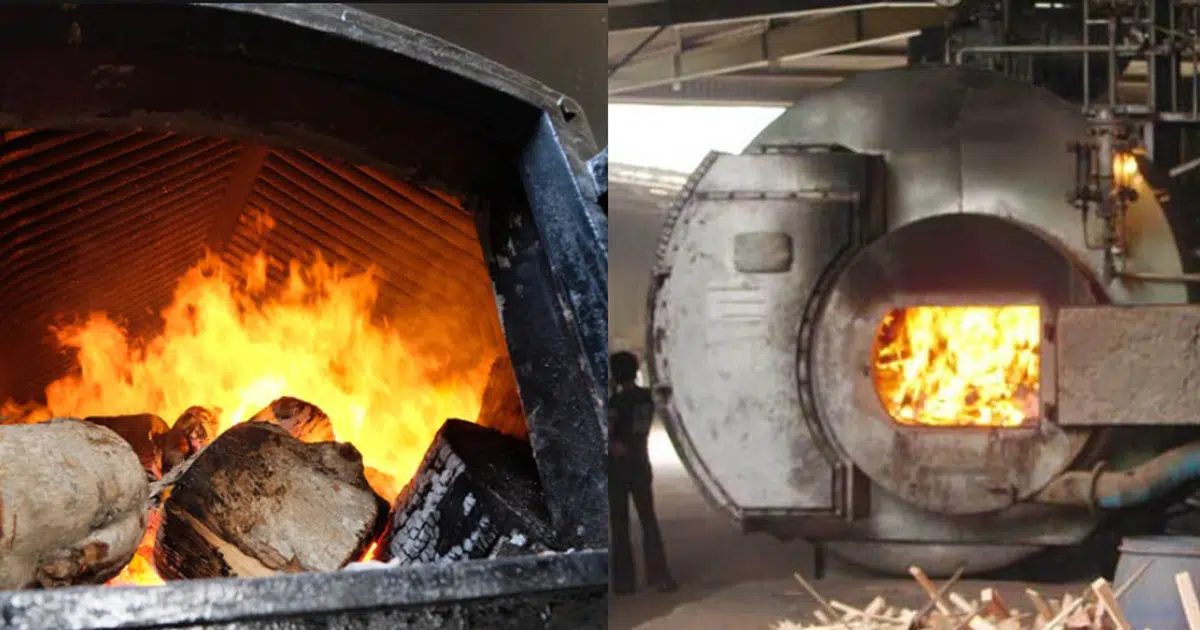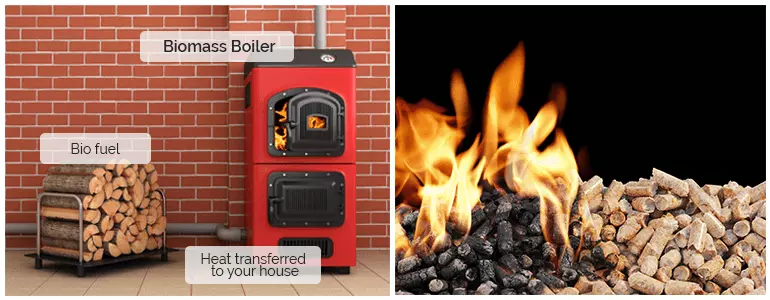
산업용 보일러에 소금을 첨가하면 끓는점이 높아집니다.. 이 기사에서는 안전한 추가에 대해 다룹니다., 정확한 측정, 효율성이 향상되었습니다..
질문이 있습니까??
물을 끓이는 것은 일상적인 요리와 다양한 산업 분야 모두에서 기본적인 과정입니다.. 일반적인 믿음에 따르면 물에 소금을 첨가하면 물이 더 빨리 끓을 수 있습니다.. 이 기사는 다음과 같은 맥락에서 이 주장을 탐구합니다. 산업용 보일러 이러한 시스템에서 소금을 안전하고 효과적으로 사용하는 방법에 대한 실질적인 조언을 제공합니다..
 장작 증기 보일러
장작 증기 보일러
제조업체의 지침을 참조하세요.: 증기 보일러에 물질을 추가하기 전에, 호환성과 안전성을 보장하려면 항상 제조업체의 지침을 참조하세요..
적절한 양의 소금 측정: 과염을 방지하려면 정확한 측정을 사용하십시오., 부식이나 스케일링이 발생할 수 있습니다.. 일반적으로, 통제된 최소량을 권장합니다.
물에 소금을 녹이세요: 보일러에 넣기 전에 소금을 소량의 물에 미리 녹입니다.. 이렇게 하면 소금이 고르게 분포되고 뭉치는 것을 방지하는 데 도움이 됩니다..
점차적으로 소금 용액을 첨가하십시오: 보일러 작동에 영향을 미칠 수 있는 갑작스러운 화학 반응을 방지하기 위해 보일러 물에 소금 용액을 천천히 첨가하십시오..
보일러 매개변수 모니터링: 소금을 넣은 후, 보일러의 매개변수를 지속적으로 모니터링합니다., 압력과 같은, 온도, 그리고 수위, 안정적인 운영을 보장하기 위해.
보일러에 소금을 추가할 때는 정확한 측정이 중요합니다.. 디지털 저울을 사용하여 소금의 무게를 정확하게 측정하세요.. 보일러 용량과 원하는 효과에 따라 금액이 달라집니다.. 산업용 애플리케이션용, 보일러 재료에 대한 악영향을 피하기 위해 일반적으로 농도는 낮게 유지됩니다..
물에 소금을 첨가해도 끓는 속도가 빨라지지는 않습니다., 다른 방법으로 도움이 될 수 있어요:
스케일 형성 방지: 소금은 보일러의 스케일 형성을 줄이는 데 도움이 될 수 있습니다., 열 전달 효율을 향상시킬 수 있는.
부식 제어: 특정 염은 물의 pH 수준을 조절하는 데 도움이 될 수 있습니다., 부식을 방지.
유지보수 효율성: 염도를 적절하게 관리하면 유지보수 빈도를 줄여 보일러의 수명을 연장할 수 있습니다..
정기점검: 수위가 권장 범위 내에 있는지 지속적으로 확인하십시오..
자동화 시스템: 자동화된 수위 모니터링 시스템을 사용하여 최적의 수위를 유지하고 수동 오류를 방지합니다..
잔액 추가: 소금 첨가로 인해 수위나 화학적 균형이 크게 바뀌지 않는지 확인하십시오..
끓는점 상승: 소금을 첨가하면 물의 끓는점이 높아진다는 사실을 이해하세요, 즉 끓이는 데 시간이 더 걸린다는 뜻.
부식 위험: 염분 농도가 높으면 부식이 가속화될 수 있습니다., 그래서 소금을 조심스럽게 넣는 것이 중요해요.
보일러 유형: 보일러마다 소금에 다르게 반응할 수 있습니다.; 항상 보일러의 특정 유형과 모델을 고려하십시오..
증기 보일러에서 물을 더 빨리 끓이는 비결은 소금을 첨가하는 것입니까??
아니요, 소금을 첨가하는 것이 더 빨리 끓이는 열쇠는 아닙니다. 사실은, 그것은 물의 끓는점을 높여준다., 끓을 때까지 더 많은 에너지와 시간이 필요함.
소금이 보일러 물을 더 빨리 끓게 만들까요??
아니요, 소금은 보일러 물을 더 빨리 끓게 만들지 않습니다. 끓는점을 높이게 됩니다, 잠재적으로 프로세스 속도가 느려질 수 있음.
소금이 보일러 물의 끓는 속도에 영향을 미칠 수 있습니까??
예, 하지만 예상했던 방식과는 다릅니다. 소금은 물의 끓는점을 높여준다, 이는 실제로 끓는 속도를 늦출 수 있음을 의미합니다..
더 빨리 끓이기 위해 증기 보일러에 소금을 추가하는 것을 고려해야 할까요??
아니요, 더 빨리 끓이려고 소금을 첨가하는 것은 효과가 없습니다.. 보일러 물에 소금을 첨가하는 주된 이유는 유지 관리 및 효율성과 관련이 있어야 합니다., 속도가 아닌.
소금이 보일러 물의 끓는점에 미치는 영향?
소금은 끓는점 상승이라는 현상으로 인해 물의 끓는점을 높입니다.. 이렇게 하려면 물이 끓기 전에 더 높은 온도에 도달해야 합니다..

바이오매스 보일러 비용
끓는 속도를 높입니다: 잘못된; 끓는점을 높이는 거죠.
열 전달 개선: 부분적으로 사실, 그러나 상황에 따라.
모든 보일러에 안전함: 항상 그런 것은 아니다; 지침을 참조하세요.
모든 시스템에 필요: 보일러 종류에 따라 다름.
모든 부식 방지: 특정 유형 및 조건만.
보편적으로 효율성 증가: 포괄적 진술이 아님.
언제든지 추가 가능: 타이밍과 방법이 중요하다.
유지 관리 필요성 제거: 감소, 하지만 없애지는 않는다.
모니터링이 필요하지 않음: 지속적인 모니터링은 필수.
모든 물 유형에 사용 가능: 물의 화학적 성질에 따라 다름.
스케일 형성 방지
부식을 제어합니다
열 전달 효율 향상
유지 관리 빈도 감소
pH 균형 유지
해야 한다: 스케일 형성 방지.
해야 한다: 부식 제어에 도움.
해야 한다: 열 전달 효율 향상.
해야 한다: 물의 화학적 성질을 유지합니다.
하지 말아야 할 것: 끓는점을 높일 수 있음.
하지 말아야 할 것: 과염화 및 부식 위험.
하지 말아야 할 것: 끓이는 데 더 많은 에너지가 필요할 수 있습니다..
하지 말아야 할 것: 모든 보일러 유형에 적합하지 않음.
하다: 제조업체의 지침을 참조하세요..
하다: 정확하게 측정하다.
하다: 보일러 매개변수 모니터링.
하지 않다: 소금을 한번에 너무 많이 넣으세요.
하지 않다: 보일러 동작 변화 무시.
하지 않다: 효율성 문제에 대한 빠른 해결 방법으로 소금을 사용하십시오..
보일러 유형
제조업체 지침
물화학
소금 농도
측정 정확도
용해과정
추가 방법
모니터링 시스템
끓는점 변화
부식 위험
스케일 형성 방지
열전달 효율
유지 보수 요구 사항
에너지 소비
전반적인 효율성
물에 소금을 첨가하면 끓는점 상승으로 알려진 집단 특성으로 인해 끓는점에 영향을 줍니다.. 소금이 물에 녹을 때, 이온으로 해리된다, 끓는 데 필요한 증기 기포의 형성을 방해합니다.. 이 혼란으로 인해 끓는점이 높아집니다., 즉, 물이 끓기 시작하려면 더 많은 열 에너지가 필요합니다..
산업용 보일러, 소금을 첨가하는 주요 목적은 끓는 속도를 높이는 것이 아니라 물의 화학적 성질을 관리하고 스케일 형성과 부식을 방지하는 것입니다.. 끓는 시간에 대한 소금의 실질적인 영향은 최소화되며 보일러 유지 관리 개선의 이점이 더 큰 경우가 많습니다..
일반적인 신화에도 불구하고, 보일러 물에 소금을 첨가해도 끓는 과정의 속도가 빨라지지 않습니다. 대신에, 끓는점을 높이고 끓는 단계에 도달하려면 더 많은 에너지가 필요합니다.. 소금 첨가의 이점은 물의 화학적 성질을 관리하고 보일러 수명을 향상시키는 능력에 있습니다..
종합적인 분석에 따르면 보일러 물에 소금을 첨가하면 여러 가지 이점이 있는 것으로 나타났습니다., 스케일 방지를 포함하여, 부식 제어, 효율적인 열 전달 유지. 하지만, 최적의 성능을 보장하고 부작용을 방지하려면 통제된 양으로 소금을 추가하고 보일러를 지속적으로 모니터링하는 것이 중요합니다..
소금이 끓는 속도를 빠르게 한다는 신화는 소금이 실제로 끓는점을 높인다는 과학적 증거에 의해 사실이 아님이 입증되었습니다.. 소금 첨가의 진정한 이점은 보일러 유지 관리 및 효율성 향상에 있습니다., 끓는 과정을 가속화하지 않고. 보일러수의 염분에 대한 올바른 이해와 관리를 통해 보일러를 보다 효과적이고 오래 지속시킬 수 있습니다..
물에 소금을 넣으면 물이 더 빨리 끓는다는 주장은 신화이다. 산업용 보일러의 맥락에서, 소금을 추가하면 실제로 끓는점이 높아집니다., 물을 끓이는 데 더 많은 에너지가 필요함. 보일러 물에 소금을 첨가하는 주요 이점은 스케일 형성 방지입니다., 부식 제어, 전반적인 효율성 향상. 소금 첨가량을 이해하고 적절하게 관리함으로써, 최적의 보일러 성능과 수명을 보장할 수 있습니다..
물에 소금을 첨가하면 끓는점이 높아진다, 즉 끓이는 데 시간이 더 걸린다는 뜻. 산업용 보일러, 소금의 실제 효과는 유지 관리에 중요하지만 끓는 속도에는 미미합니다.. 보일러 설계 최적화와 같은 방법을 사용하십시오., 열 입력 증가, 더 빨리 끓이려면 물을 예열해야 합니다.. 이 기사는 주제에 대한 명확성을 제공하고 산업 응용 분야의 효율성을 향상시키는 데 도움을 줍니다..
무료 보일러 견적
지체없이, 얻다 3 오늘 인용 최고의 가격 비교 안전하고 믿을 수 있는리뷰
V우리 고객의 iew 리뷰
"우리는 수년 동안 화학 플랜트에 Fangkuai 열유 보일러를 사용해 왔으며 결코 우리를 실망시킨 적이 없습니다.. 보일러는 매우 내구성이 강하고 열악한 조건을 견딜 수 있습니다.. 또한 작동 및 유지 관리가 매우 쉽습니다., 유지 관리에 드는 시간과 비용을 절약할 수 있었습니다.. Fangkuai의 열유 보일러는 최고 수준이며 신뢰할 수 있는 난방 솔루션이 필요한 모든 사람에게 강력히 추천합니다."
장
중국"Fangkuai의 열유 보일러는 작동 및 유지 관리가 매우 쉽습니다.. 유지 관리에 드는 시간과 비용을 절약하는 데 도움이 되었습니다., 이는 상당한 비용 절감으로 이어졌습니다.. 재료의 품질과 보일러의 구조는 탁월합니다.. 또한 매우 에너지 효율적입니다, 에너지 비용을 절약하는 데 도움이 되었습니다.. Fangkuai의 열유 보일러를 적극 추천합니다. ."
알렌
브라질"Fangkuai의 온수 보일러는 놀랍습니다.. 빠르고 효율적으로 가열됩니다., 그리고 물은 오랫동안 뜨겁게 유지됩니다. 우리는 그것에 대해 어떤 문제도 없었으며 일상적인 작업에서 상당한 개선을 이루었습니다.. 설치 과정도 매우 순조로웠고 고객 서비스도 훌륭했습니다.. Fangkuai의 온수 보일러를 적극 추천합니다."
사라
캐나다"Fangkuai의 온수 보일러는 놀랍습니다.. 빠르고 효율적으로 가열됩니다., 그리고 물은 오랫동안 뜨겁게 유지됩니다. 우리는 그것에 대해 어떤 문제도 없었으며 일상적인 작업에서 상당한 개선을 이루었습니다.. 설치 과정도 매우 순조로웠고 고객 서비스도 훌륭했습니다.. Fangkuai의 온수 보일러를 적극 추천합니다."
사라
캐나다"Fangkuai의 증기 발생기는 소규모 비즈니스에 적합합니다.. 사용하기 매우 쉽고 최소한의 유지 보수가 필요합니다.. 또한 매우 에너지 효율적입니다, 에너지 비용을 절약하는 데 도움이 되었습니다.. Fangkuai의 고객 서비스도 훌륭합니다.. 그들은 매우 반응이 좋으며 항상 기꺼이 도와줍니다.. Fangkuai의 증기 발생기를 강력히 추천합니다."
아메드
이집트"Fangkuai의 보조 장비는 내 보일러 시스템을 더욱 향상시켰습니다.. 장비의 품질은 탁월하고 가격은 매우 합리적입니다.. 이 장비는 보일러 시스템의 효율성과 성능을 개선하는 데 도움이 되었습니다., 이는 상당한 비용 절감으로 이어졌습니다.. 고품질 보일러 액세서리가 필요한 사람에게 Fangkuai의 보조 장비를 적극 권장합니다."
마리크
영국"Fangkuai의 보조 장비는 내 보일러 시스템을 더욱 향상시켰습니다.. 장비의 품질은 탁월하고 가격은 매우 합리적입니다.. 이 장비는 보일러 시스템의 효율성과 성능을 개선하는 데 도움이 되었습니다., 이는 상당한 비용 절감으로 이어졌습니다.. 고품질 보일러 액세서리가 필요한 사람에게 Fangkuai의 보조 장비를 적극 권장합니다."
마리크
영국"Fangkuai의 증기 발생기는 소규모 비즈니스에 적합합니다.. 사용하기 매우 쉽고 최소한의 유지 보수가 필요합니다.. 또한 매우 에너지 효율적입니다, 에너지 비용을 절약하는 데 도움이 되었습니다.. Fangkuai의 고객 서비스도 훌륭합니다.. 그들은 매우 반응이 좋으며 항상 기꺼이 도와줍니다.. Fangkuai의 증기 발생기를 강력히 추천합니다."
아메드
이집트"나는 Fangkuai의 온수 보일러의 품질에 깊은 인상을 받았습니다.. 지속되도록 제작되었으며 내 기대를 뛰어 넘었습니다.. 설치 과정도 매우 순조로웠고 고객 서비스도 훌륭했습니다.. 온수 보일러는 작동 및 유지 관리가 매우 쉽습니다., 그리고 에너지 효율성은 현저하다. Fangkuai의 온수 보일러를 적극 추천합니다."
잭
호주